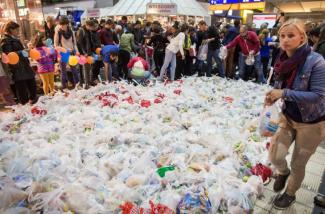Europe
A good start

Civil-society activism has changed Germany this summer. For decades, political leaders assumed that people were uncomfortable with refugees and migrants in general. Accordingly, they enforced strict rules to limit access to the country. Indeed, right-wing extremists are still causing trouble, as recurrent cases of arson prove. However, the vast majority of Germans are appalled by such violence. Most people see that refugees are in distress and deserve help. Masses have assembled to welcome them.
This enthusiasm has spread fast. The Federal Government now wants to lend immediate support to refugees, without long bureaucratic procedures. On a single weekend in September, it allowed tens of thousands of refugees, who were stuck in Hungary, into the country. Moreover, it earmarked € 6 billion for subnational authorities so they will be able to rise to the challenges. Chancellor Angela Merkel stated in very clear words that asylum is a fundamental right. She added: “We will cope.”
Her stance is correct, and it makes developmental sense. Europe cannot preach human rights internationally whilst insulating itself from refugees. The west must live up to basic humanitarian standards if it wants to win hearts and minds in Muslim countries haunted by fundamentalism. Moreover, the best ambassadors for change in countries under authoritarian rule are migrants who have personally experienced democracy and the rule of law.
Germany's new attitude, however, is causing irritation inside the EU. The Federal Government has spontaneously and unilaterally abandoned a principle agreed years ago at a summit in Dublin. That principle is that refugees must appeal for asylum in the EU country they first arrive in. This rule is indeed dysfunctional because all refugees that arrive by sea or land first enter a southern or eastern European country. In view of humanitarian need, it is certainly legitimate to breach it. The snag, however, is that EU members are supposed to be bound by European agreements.
Jean-Claude Juncker, the president of the European Commission, shares the German view of matters. He has proposed new quotas, so all EU members would accept a fair number of refugees according to their size and capacity. The EU's Council of Ministers adopted this principle, but it did not achieve the consensus it normally strives for. Some east European countries voted against the new system. Victor Orbán, the prime minister of Hungary, now accuses Germany of "moral imperialism", and a special summit of the EU's heads of state and government passed decisions to keep refugees away from the EU.
A host of issues has not been sorted out yet. For example, Germany's subnational authorities, which must accommodate the newly arrived, doubt that the € 6 billion pledged by the Federal Government for that purpose will do. The Federal Government fast then added another € 1 billion. Will it do? According to Juncker's ideas, an additional 160,000 refugees will be relocated within the EU this year, but Germany alone expects to see 800,000 arrive. Moreover, member countries are reintroducing border controls that were discontinued a long time ago.
Juncker wants to declare Turkey a safe country from where there is no reason to flee, even though violence is escalating there, with security forces clamping down on Kurdish insurgents. Kurdish forces, howver, are needed in the fight against ISIS. The EU is prepared to grant substantial funding to refugee camps outside its borders, even though the international community knows from experience that huge camps are breeding grounds of extremism. The Taliban are only one example.
Some European leaders appreciate Russian proposals to join forces with Syria’s dictator Bashar al-Assad in the fight against ISIS moreover. It is true that diplomats must get in touch with the Syrian regime. The tyrant, however, has shed so much blood that there can be no peace in Syria with him staying on in a position of leadership. Turkey's government considers him a greater problem than ISIS. In the meantime, Paris wants to support US air raids against ISIS in Syria with surveillance flights, whilest London has announced air raids by British bombers. It is well understood, however, that stability cannot be achieved without boots on the ground.
Europe needs a coherent policy. Germany’s new welcoming culture is a good start, but a lot more needs to happen.
Updated on 25 September 2016







